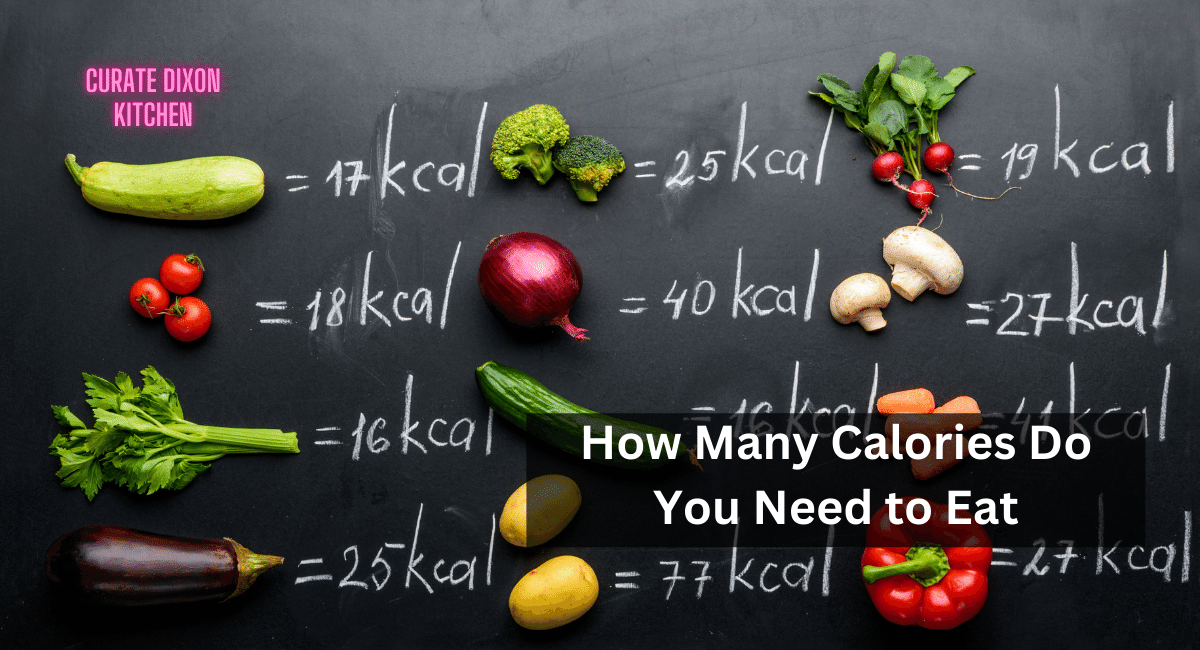Caloric needs, also known as daily caloric requirements or energy intake, play a fundamental role in maintaining our health and well-being. The daily amount of calories an individual requires is determined by several factors, such as age, gender, activity level, metabolism, and health objectives. In this guide, we will explore how to calculate caloric needs, the factors influencing them, and how to balance calorie intake and expenditure for optimal health.
Basics of Calories
1 What is a Calorie?
Understanding what a calorie is is crucial before discussing caloric needs. An energy measurement in the context of nutrition is called a calorie. It takes one calorie of energy to increase the temperature of one gram of water by one degree Celsius. In human nutrition, kilocalories (kcal) gauge a food’s energy content.
2 The Role of Calories in the Body
Calories serve as the body’s primary source of energy. They fuel all bodily functions, including breathing, digestion, physical activity, and cellular repair. To maintain overall health, balancing calorie intake with calorie expenditure is crucial.
3 Caloric Sources
Calories come from three main macronutrients in our diet:
Carbohydrates:
Provide 4 calories per gram and are the body’s preferred energy source.
Proteins:
Proteins provide 4 calories per gram, and Proteins are essential for repairing and building muscle tissue.
Fats:
Provide 9 calories per gram and serve as a long-term energy reserve.
14 Defining Caloric Needs
Caloric needs are the amount of calories an individual requires daily to maintain their weight, factoring in their basal metabolic rate (BMR) and physical activity level.
Factors Influencing Caloric Needs
1 Basal Metabolic Rate (BMR)
Your body needs a specific number of calories to carry out essential functions like breathing and regulating body temperature when resting. This is called your BMR and can be affected by factors like age, gender, and genetics. Your BMR may decrease as you age, and men generally have a higher BMR than women.
2 Activity Level
Physical activity plays a significant role in determining caloric needs. Someone with a sedentary lifestyle will require fewer calories than an athlete with intense training sessions. The Harris-Benedict Equation is a frequently used tool for estimating daily calorie requirements based on activity levels.
3 Body Composition
When the body is at rest, muscle burns more calories compared to fat. Those with more muscle require more calories to maintain weight.
2.4 Health Goals
Caloric needs also depend on an individual’s health goals. Those looking to lose weight need to create a calorie deficit, while those aiming to gain weight or build muscle must consume more calories than they expend.
Calculating Caloric Needs
1 Determining BMR
Calculating your BMR is the first step in finding your daily caloric needs. The Mifflin-St Jeor Equation is a widely accepted method for estimating BMR:
For Men: BMR = 88.362 + (13.397 × weight in kg) + (4.799 × height in cm) – (5.677 × age in years)
For Women: BMR = 447.593 + (9.247 × weight in kg) + (3.098 × height in cm) – (4.330 × age in years)
2 Accounting for Activity Level
After calculating BMR, you need to adjust it based on your activity level:
- Sedentary (little or no exercise): BMR × 1.2
- Lightly active (gentle workout or sports 1-3 days/week): BMR × 1.375
- Moderately active (gentle exercise or sports 3-5 days/week): BMR × 1.55
- energetic (hard exercise or sports 6-7 days a week): BMR × 1.725
- Super active (very hard exercise and a physical job or 2x training): BMR × 1.9
3 Weight Goals
If you want to lose weight, it’s critical to consume less calories than your body needs. This refers to the development of calorie deficits. On the other hand, You need to consume more calories than your body burns in order to gain weight. To make small, lasting changes, aiming for a daily 500–1000 calorie deficit or surplus is advisable.
4. Total Daily Energy Expenditure (TDEE)
While BMR lays the foundation for calorie needs, your Total Daily Energy Expenditure (TDEE) accounts for all the calories you burn daily. TDEE includes:
- BMR.
- The calories burned during physical activity.
- The thermic effect of food (calories expended during digestion).
Factors Affecting TDEE
Numerous factors influence your TDEE, making it a dynamic value:
- Age: Your BMR may decrease as you age, impacting your TDEE.
- Gender: Due to differences in muscle mass and hormonal factors, men usually have a higher Total Daily Energy Expenditure (TDEE) than women.
- Genetics: Genetic variations can affect how efficiently your body utilizes calories.
Physical Activity: The higher your level of physical activity, the greater your total daily energy expenditure (TDEE) will be.
Monitoring and Adjusting Caloric Intake
1 Keeping a Food Diary
To accurately gauge how many calories you’re consuming, maintain a food diary. Document everything you eat and drink, along with portion sizes. Numerous apps and online tools make this process easier.
2 Tracking Progress
Regularly monitor your weight, body measurements, and how you feel. If you need to see the desired results, you may need to adjust your calorie intake or activity level.
3 Consult a Professional
If you’re unsure about your caloric needs or have specific health concerns, it’s advisable to consult a registered dietitian or healthcare provider. They can provide personalized guidance and help you set realistic goals.
The Importance of Nutrient Quality
1 Nutrient Dense vs. Empty Calories
It’s not just about the number of calories; the quality matters, too. Nutrient-dense foods provide essential vitamins, minerals, and other nutrients, while empty-calorie foods offer little nutritional value. Prioritizing nutrient-dense foods like fruits, vegetables, lean proteins, and whole grains is essential for overall health.
2 Balancing Macronutrients
A balanced diet includes an appropriate distribution of carbohydrates, proteins, and fats. The Dietary Guidelines for Americans recommend that:
- Carbohydrates make up 45-65% of daily calories.
- Proteins make up 10-35% of daily calories.
- Fats make up 20-35% of daily calories.
Special Considerations
1 Pregnancy and Lactation
Pregnant and lactating individuals have increased caloric needs to support fetal development and breastfeeding. These needs should be discussed with a healthcare provider.
2 Medical Conditions
Caloric requirements may be impacted by certain medical diseases, such as diabetes or thyroid problems. Specialized dietary recommendations are frequently needed to manage these diseases.
3 Aging
Our metabolism and activity levels change as we age, so that we may need fewer calories. Adjusting our eating habits to stay healthy and prevent weight gain is important.
It’s crucial to comprehend and control your calorie requirements to keep your weight in check and feel well overall. Considerations for calculating calorie needs include BMR, activity level, and health objectives. However, it’s equally important to concentrate on the caloric value of meals, give nutrient-dense foods top priority, and get expert advice when required. A balanced and sustained calorie intake can greatly enhance a long and healthy life.










